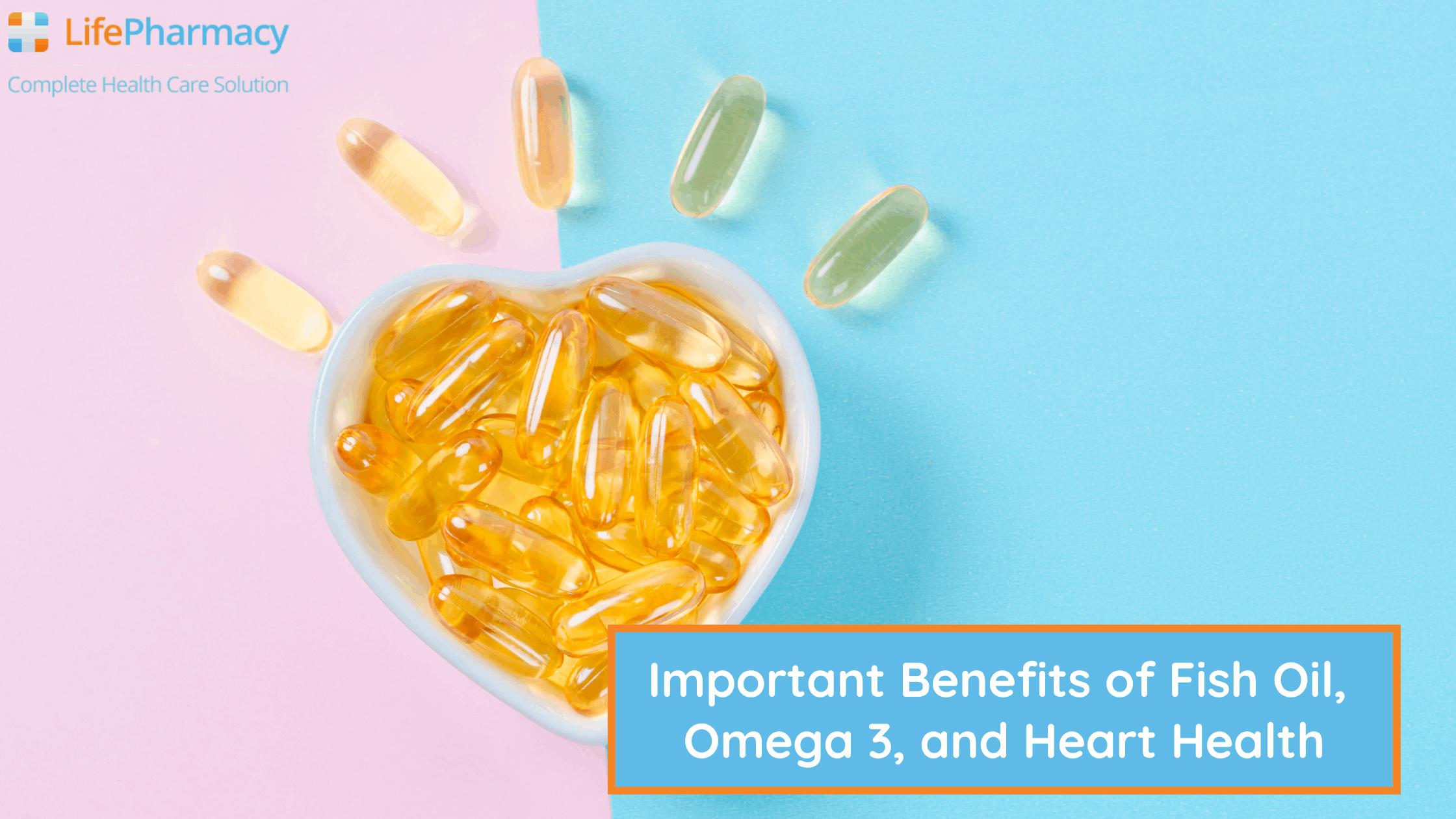Consuming various supplements to compensate for the lack of nutrients the body needs for proper functioning is a popular trend these days. According to research, fish oils may benefit people with heart disease. However, omega-3 fatty acids, a family of polyunsaturated fats, are the real source of cardiovascular health.
Read this guide from an online pharmacy to know the important benefits of fish oil, omega 3, and heart health:
What are Omega-3s?

Researchers advocate that dietary fat must be avoided at all costs as it is harmful to the heart. But there are certain unsaturated fats (α-linoleic acid (ALA), eicosapentaenoic acid (EPA), and docosahexaenoic acid (DHA)) that are heart-healthy and can prove to be beneficial for normal development and growth. These are known as omega - 3 fatty acids.
ALA is primarily found in plant-based foods such as olive, soybean, canola, walnut, and flaxseed. However, primary EPA and DHA sources are marine-based foods containing a lot of oil, such as salmon, tuna, mackerel, trout, halibut, herring, and cod.
Since the human body cannot make omega-3 fatty acids, it becomes essential to procure them from our diet. Like other vitamins and supplements we take for bones, hair, skin, etc., many health practitioners recommend omega-3 supplements to overcome the deficit in our body. Older adults are more dependent on supplements for their well-being.
What are the benefits of Omega-3 fatty acids?

-
Lowers Triglyceride Levels
A type of fat found in the blood and stored as body fat is triglycerides. When triglyceride levels in the blood increase, it leads to the deposition of fat in the artery walls, thus alleviating your risk of suffering from a stroke or heart attack. Omega-3s have been found to lower triglyceride levels, thus improving heart health.
-
Reduces Risk of Arrhythmia
The abnormal beating of the heart is referred to as arrhythmia. Headaches can often accompany heart palpitation; however, many underlying causes of this issue can be diagnosed by a medical practitioner only.
Although increased omega-3 intake may reduce the risk of some arrhythmias, it cannot be used as a medication to treat this problem. Besides consuming omega 3 capsules, there are several other ways to maintain a healthy heart.
-
Reduces the Rate of Plaque Buildup
Plaque is a substance that comprises fat, cholesterol, and calcium. When plaque deposits in your artery walls, it hardens and blocks your arteries, limiting the flow of blood rich in oxygen throughout your body.
A fish-rich diet, low in saturated fat and high in omega-3 fats, has been associated with a reduced heart attack and stroke risk. Another benefit of Omega-3s is that they have anti-oxidizing and anti-inflammatory effects, improving the function of the endothelial cells that line blood vessels. Many researchers have outlined the benefit of omega-3 intake for cardiovascular disease, but this has not been proven in clinical trials yet.
-
Slightly Lower Blood Pressure
High blood pressure is a silent killer; people diagnosed with high blood pressure must measure it regularly using the blood pressure monitor UK. Blood pressure medication must be consumed without fail; an unprecedented rise in blood pressure levels can increase the chances of heart attack and stroke.
Higher omega-3s have demonstrated a favorable result in controlling systolic blood pressure (pressure in your arteries during the contraction of your heart muscle) and diastolic blood pressure (pressure in your arteries between successive heartbeats).
How much Omega-3 do you need for heart health?
If possible, omega-3 fatty acids should be consumed through plant or marine-based food sources rather than dietary fish oil supplements. The American Heart Association (AHA) recommends eating at least two servings a week of cold water oily fish such as salmon, mackerel, trout, tuna, herring, and sardines. These fishes are rich in omega-3s.
A word of caution: Eating fish tainted with mercury and other chemicals can pose health risks for young children and pregnant women. Pregnant women and children should avoid fish like swordfish, shark, tilefish, and king mackerel that may be tainted with high levels of mercury. Middle-aged or older individuals run the minimal risk from eating these fish.
On the other hand, for non-fish lovers and vegans, there is good news. They can derive their omega-3s from plant-based food sources such as ground flaxseeds, walnuts, chia seeds, soybeans, tofu, flaxseed oil, canola oil, and soy oil; the highest amount of ALA can be derived from ground flaxseeds and flaxseed oil. Replacing ground flaxseed over granola or using it in smoothies can serve the purpose. In addition, flaxseed oil complements well in salad dressing.
Besides this, fortified foods, including some brands of milk, yogurt, eggs, juices, soy drinks, and infant formulas, may also improve the body's ratio of omega-3 fatty acids.
Additionally, reducing omega-6 fatty acids levels by omitting foods like meats, eggs, and oils, can also improve the ratio of omega-3 fatty acids in the blood, effectively raising its concentration in the body. An imbalance in the omega-6 fatty acids and omega-3 fatty acids ratio, where the ratio of omega-6 is higher, can lead to the onset of many diseases.
Although consuming high-quality omega-3 fatty acid supplements may prove beneficial, Online chemist UK recommends that patients must do so only after consulting their physician. Taking the right dosage is quintessential for the best results.
What are the risks of taking omega-3 fatty acids?
Stomach upset, and diarrhea are the most common side effects of Omega-3 fatty acid supplements. However, those consuming a higher dosage may witness more severe side effects.
If you are on blood thinners, anti-inflammatory painkillers like ibuprofen, or antiplatelet drugs, then consuming omega-3 fatty acid supplements may increase the risk of bleeding.
Conclusion
Omega-3 supplements from fish oil may protect cardiovascular health, but they will certainly not cure your heart-related ailments. Before reaching for supplements, it may be worth following a nutritious diet full of fresh fruits and vegetables, rich in vitamins and minerals. In addition, following preventive care measures, including regular check-ups, reducing stress, smoking, alcohol, and regular exercise, is your best bet to maintain a healthy heart.
Life Pharmacy UK recommends a consultation before adding omega-3s to your diet. It will ensure they won’t interfere with other health conditions or medications. If you opt for OTC medication, they do not contain toxins such as mercury or unwanted ingredients such as saturated fatty acids. UK online pharmacy can provide you with fish oil supplements 24/7. Contact us now!






